Related Research Articles
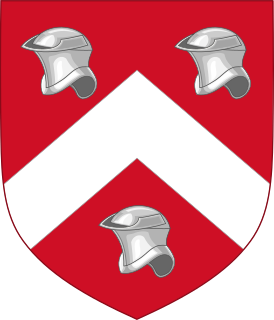
Sir Owen Tudor was a Welsh courtier and the second husband of Catherine of Valois (1401–1437), widow of King Henry V of England. He was the grandfather of Henry VII, founder of the Tudor dynasty.

Sir John Wynn, 1st Baronet, was a Welsh baronet, Member of Parliament and antiquary.

Sir William ap Thomas was a Welsh nobleman, politician, knight, and courtier. He was a member of the Welsh gentry family that came to be known as the Herbert family through his son William Herbert, 1st Earl of Pembroke and is the agnatic ancestor, via an illegitimate descendant of the 1st Earl of the 8th creation, of the current Herbert family of the Earl of Pembroke and Montgomery, and also of the Herbert Earl of Carnarvon.
Ednyfed Fychan, full name Ednyfed Fychan ap Cynwrig, was a Welsh warrior who became seneschal to the Kingdom of Gwynedd in Northern Wales, serving Llywelyn the Great and his son Dafydd ap Llywelyn. Fychan claimed descent from Marchudd ap Cynan, Lord of Rhos, 'protector' of Rhodri Mawr, King of Gwynedd. He was ancestor of Owen Tudor and thereby of the Tudor dynasty.

Sir John Wynn, 5th Baronet was a Welsh landowner and Tory politician who sat in the English and British House of Commons between 1679 and 1713.

Tomos Prys (c.1564–1634) was a Welsh soldier, sailor and poet. He was the eldest son of Ellis Price MP, of Plas Iolyn, Pentrefoelas, Denbighshire.

Edward Pryce Lloyd, 1st Baron Mostyn, known as Sir Edward Lloyd, 2nd Baronet from 1795 to 1831, was a British politician.
The Williams, later Williams-Bulkeley Baronetcy, of Penrhyn in the County of Caernarvon, is a title in the Baronetage of England. It was created on 17 June 1661 for Griffith Williams. He had already been granted a baronetcy by Oliver Cromwell in 1658. The second Baronet represented both Caernarvonshire and Caernarvon in the House of Commons. The eighth Baronet sat as Member of Parliament for Beaumaris while the ninth Baronet represented Caernarvonshire and Beaumaris. The tenth Baronet was Member of Parliament for Beaumaris, Anglesey and Flint Burghs and served as Lord Lieutenant of Caernarvonshire. In 1826 he assumed by Royal licence the additional surname of Bulkeley on succeeding to the estates of Thomas James Bulkeley, 7th Viscount Bulkeley. The twelfth and thirteenth Baronets were both Lord Lieutenant of Anglesey while the latter was also Lord Lieutenant of Gwynedd. The family seat is Baron Hill, Anglesey. Arms of Williams of Penrhyn: Gules, a chevron ermine between three Saxon's heads in profile couped proper.
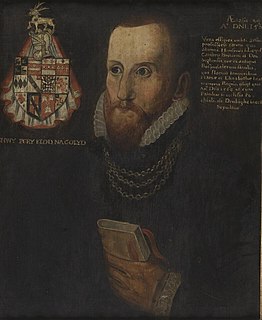
Humphrey Llwyd (1527–1568) was a Welsh cartographer, author, antiquary and Member of Parliament. He was a leading member of the Renaissance period in Wales along with other such men as Thomas Salisbury and William Morgan. His library, together with those of his patron, the Earl of Arundel and his brother-in-law, Lord Lumley, formed the basis of the Royal Collection of books; currently housed at the British Library. His motto was Hwy pery klod na golyd.

Sir John Glynne KS was a Welsh lawyer of the Commonwealth and Restoration periods, who rose to become Lord Chief Justice of the Upper Bench, under Oliver Cromwell. He sat in the House of Commons at various times between 1640 and 1660.
This article is about the particular significance of the year 1785 to Wales and its people.
John Vaughan, 1st Earl of Carbery was a Welsh courtier and politician who sat in the House of Commons in 1601 and from 1621 to 1622. He served Robert Devereux, 2nd Earl of Essex, and later Prince Charles, heir to the throne of King James I. However, his career ended when the Prince acceded to the throne in 1625, and he later estimated that serving the Prince had cost him £20,000, which went unrecompensed.
Sir Roger Mostyn, 3rd Baronet, of Mostyn Hall, Holywell, Flintshire, was a Welsh Tory politician who sat in the English and British House of Commons for 25 years from 1701 to 1735.
Sir Francis Barrington, 1st Baronet of Barrington Hall, Essex was a Puritan activist and politician, who was MP for Essex from 1601 to 1604, then 1620 to 1628.
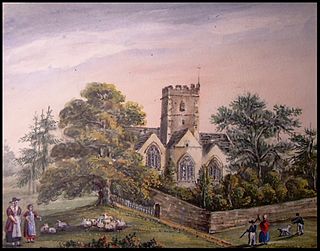
Gwladys ferch Dafydd Gam was a Welsh noblewoman. She was the daughter of Dafydd ap Llewelyn ap Hywel, otherwise known as Dafydd Gam, who was killed at the Battle of Agincourt in 1415.
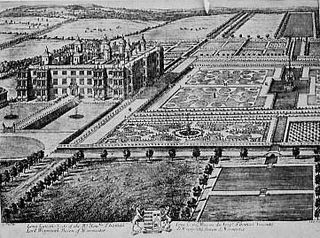
Sir Thomas Thynne, of Longleat, Wiltshire, was an English landowner and politician who sat in the House of Commons at various times between 1601 and 1629. His romance with the daughter of his family's enemies may have inspired Shakespeare to pen Romeo and Juliet.
John Griffith was a Welsh politician who sat in the House of Commons from 1571 to 1609.
William Hughes was a Welsh bishop of St Asaph.
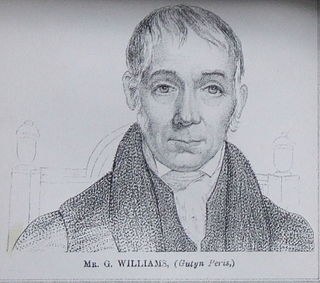
Griffith Williams (1769–1838) was a Welsh language poet. He chose Gutyn Peris as his Bardic name.
Paul Panton was a Welsh barrister and antiquarian. He was known also as a reforming farmer and collector, as well as for his knowledge of Welsh history.
References
- 1 2 3 4 Appleby, John C. "Griffith, Piers". Oxford Dictionary of National Biography (online ed.). Oxford University Press. doi:10.1093/ref:odnb/11605.(Subscription or UK public library membership required.)
- ↑ Thomas Pennant, Tour in Wales, 1781, ii. 285; John Thomas, in William Williams, Observations on the Snowdon Mountains, 1802, p. 177.
- ↑ Lloyd, Glenys Mair (2015). Piers Griffith – Pirate of Penrhyn 1568 – 1628, Humphreys Signs Ltd, ISBN 9780993262708. Gwales.
![]() This article incorporates text from a publication now in the public domain : "Griffith, Piers". Dictionary of National Biography . London: Smith, Elder & Co. 1885–1900.
This article incorporates text from a publication now in the public domain : "Griffith, Piers". Dictionary of National Biography . London: Smith, Elder & Co. 1885–1900.